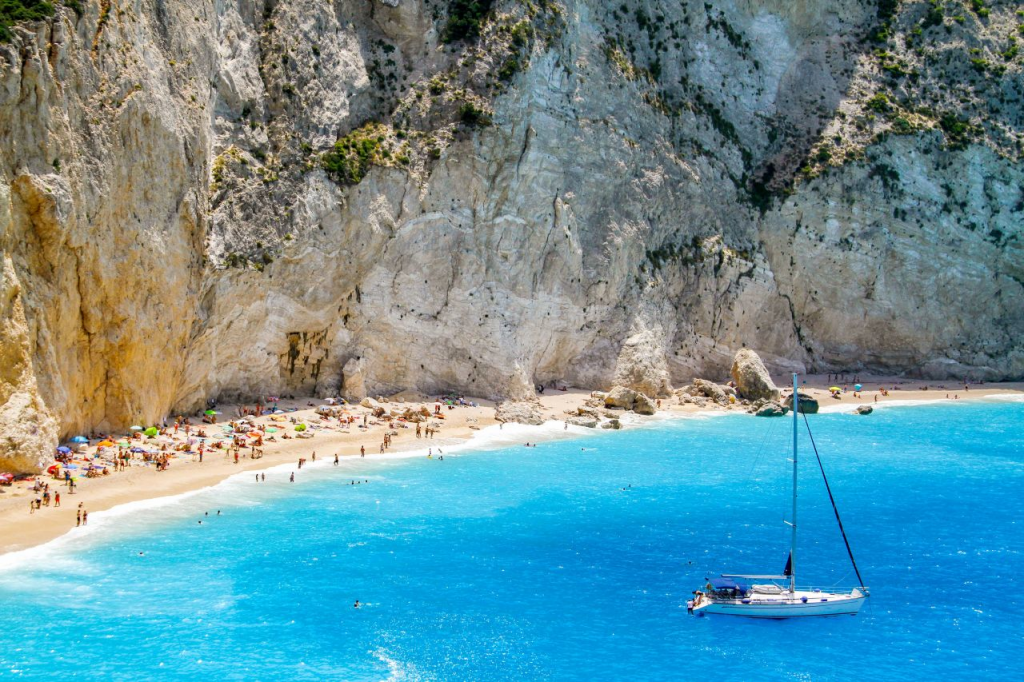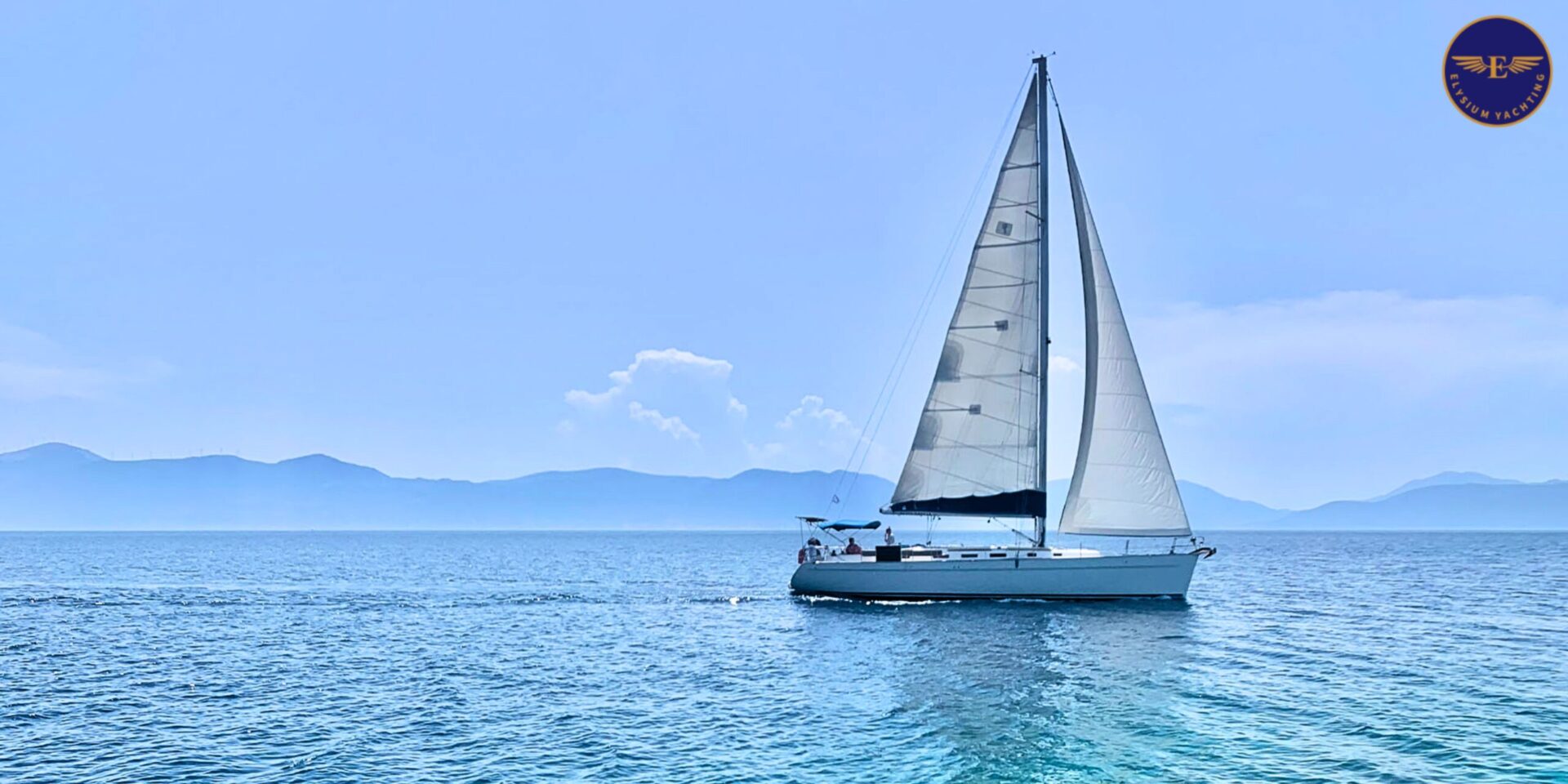Sailing in the Ionian Sea
Q. What is it like sailing in the Ionian Sea?
A. Sailing the Ionian Sea is like embarking on a voyage through time itself, where ancient myths intertwine with the vibrant hues of the Mediterranean. As the gentle breeze fills the sails, the rhythmic lull of the waves beneath the hull carries you into a state of serene bliss. Each island beckons with its own story waiting to be discovered, from the sun-drenched beaches of Corfu to the quaint fishing villages of Kefalonia. Amidst the azure waters and picturesque landscapes, every moment becomes a cherished memory etched into the fabric of your maritime adventure.
Q. Tips on selecting your type of trip, Chartered or Flotilla?
A. Choosing between a bareboat charter and flotilla sailing in Greece hinges on your preference for independence or community. Opting for a bareboat charter allows for complete freedom to chart your own course, perfect for experienced sailors seeking solitude and adventure. Conversely, flotilla sailing offers a supportive community atmosphere, ideal for those seeking camaraderie and guidance while exploring the stunning Greek islands. Our experienced skipper and crew are always close by on hand to assist you with any aspect of your flotilla sailing tour.
Q. Some advice for preparing for sailing in the Ionian Sea?
A. Preparing for sailing in the Ionian Sea entails meticulous planning and attention to detail. Begin by familiarizing yourself with the local maritime regulations and weather patterns to ensure a safe journey. Stock your vessel with essential provisions, including food, water, and safety equipment, and consider obtaining nautical charts for navigation. Finally, embrace the spirit of adventure but also be prepared for unforeseen challenges by packing adequate supplies and maintaining open communication with your crew.
Q Is the Ionian rough or calm?
A. Generally calm during the mornings in the summer months, can be a little windy in the afternoons. The Ionian Sea is generally known for its calm and tranquil waters, providing an idyllic setting for sailing. Its sheltered bays and gentle breezes create favourable conditions for enjoyable voyages. However, like any body of water, it can experience occasional rough patches, particularly during winter storms or strong winds, so it’s essential for sailors to stay vigilant and heed weather forecasts. Despite this, the overall reputation of the Ionian Sea remains favourable for those seeking a peaceful and scenic sailing experience. A good starting place in the Ionian area is from Lefkada, as the area is quite sheltered and generally calm for sailing. It is a good place to learn sailing or practice your skills, safe navigation, and yacht handling.
Q. Is the Ionian Sea warmer than the Mediterranean?
A. The Ionian Sea, located within the broader Mediterranean region, generally experiences warmer temperatures than the central and eastern parts of the Mediterranean. This is due to its southern location and proximity to the African continent, which allows for the influence of warmer currents. Consequently, the Ionian Sea tends to have milder winters and warmer waters during the summer months, making it a popular destination for swimming, snorkelling, and other water activities. However, variations in temperature can still occur depending on the specific location and time of year.
Q. Why is the Ionian Sea so clear?
A. The exceptional clarity of the Ionian Sea can be attributed to several factors. Firstly, limited industrial activity and minimal pollution in the region help maintain water quality. Secondly, the relatively low levels of sediment runoff from rivers compared to other areas of the Mediterranean contribute to clearer waters. Additionally, the Ionian Sea benefits from efficient oceanographic circulation patterns that promote the dispersal of particles and sediments, further enhancing its transparency. Lastly, the abundant marine life, including various species of plankton and fish, play a role in maintaining the balance of the ecosystem, contributing to the overall clarity of the water.
Q. Are there dolphins in the Ionian Sea?
A. Yes, there are dolphins in many areas of the Ionians. Pods of dolphins can perform spectacular breaches right in front of your sailboat, this is one of the reasons to always keep your camera on hand, as breaches can be over quite quickly. If you see dolphins, immediately switch off your engine, or if you cannot, then place the propellor in neutral gear so that it cannot hurt the dolphins. When sailing north from Kefalonia or Ithaki, in the direction of Kastos or Kalamos, keep you eyes open for dolphins, as many pods frequent this area.
Q. Which Ionian Island has the best beaches?
A. Determining which Ionian Island boasts the best beaches is subjective and depends on personal preferences. However, Zakynthos is often celebrated for its iconic Navagio Beach, known for its pristine white sands and crystal-clear turquoise waters. Corfu, with its diverse coastline, offers a mix of sandy shores like Glyfada Beach and secluded coves such as Paleokastritsa. Meanwhile, Kefalonia’s Myrtos Beach is renowned for its dramatic cliffs and striking azure waters, making it a contender for some of the most picturesque shores in the Ionian archipelago. Ultimately, the “best” beach experience varies based on factors like scenery, accessibility, and desired activities.
Q. What are the best ports to visit in the Ionian Sea?
A. Exploring the Ionian Sea offers a treasure trove of captivating ports, each with its own unique charm. Corfu Town’s UNESCO-listed Old Town and bustling port welcome visitors with its Venetian architecture and vibrant atmosphere. Kefalonia’s picturesque port of Fiskardo beckons with its colourful waterfront and charming tavernas, offering a taste of traditional Greek island life. Zakynthos’ port of Zakynthos Town provides a blend of history and modern amenities, with opportunities to explore ancient ruins and relax on nearby beaches. Lefkada’s lively port of Nydri serves as a gateway to the island’s stunning coastline and nearby islets, perfect for those seeking both relaxation and adventure. This question is, however, difficult to answer. because all the islands in the group have delightful ports.
Q. What are the best islands to visit?
A. Lefkada, Meganisi, Kalamos, Kastos, Ithaka and Kefalonia are a good choice.
Q. What are the 7 Ionian Islands?
A. Corfu, Lefkada, Meganisi, Kalamos, Kastos, Ithaka, Kefalonia and Zakynthos.
Q. What is unique about the Ionian Sea?
A. The Ionian Sea stands out for its stunning clarity, offering visibility that rivals some of the clearest waters in the Mediterranean. Its diverse marine life, including vibrant coral reefs and schools of colourful fish, make it a haven for snorkelers and divers. Additionally, the Ionian Islands dotting its azure expanse boast a rich history and cultural heritage, blending influences from ancient Greece, Byzantium, Venetian rule, and more. The region’s mild climate, characterized by warm summers and mild winters, further enhances its allure, attracting visitors year-round to enjoy its pristine beaches, picturesque landscapes, and charming coastal towns. The Ionian Sea offers calm and sheltered ports, generally relaxed sailing, less crowded destinations and hundreds of beautiful safe bays and coves to anchor in.





